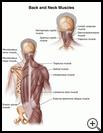
Neck Injuries
________________________________________________________________________
KEY POINTS
- Neck injuries can be minor or very serious, depending on if there is damage to the spinal cord. Types of injuries include muscle or tendon strain, nerve injuries, or breaks in one or more of the bones in your neck.
- Treatment depends on the type of neck injury. Do not move someone with a possible spinal injury until emergency providers arrive. Movement may make the injury worse. Healthcare providers will protect the neck and spine before moving the person.
- To help prevent neck injuries, always wear a seatbelt when riding in a car, and a helmet when riding a bike or motorcycle. Wear protective equipment when playing sports.
________________________________________________________________________
What are neck injuries?
Neck injuries can be minor or very serious, depending on if there is damage to the spinal cord. Common causes of neck injuries include car or motorcycle accidents, diving accidents, sports injuries, and activities such as amusement park rides. Common neck injuries include:
- Neck spasm: A neck spasm is sudden uncontrollable tightening of the muscles in your neck. The muscles get tight, hard, and painful. Neck spasms may happen from an injury, overuse, poor posture, or stress. For example, you may get neck spasms after a lot of computer work or from sleeping in an awkward position.
- Neck strain: A strain is a tear of a muscle or tendon in your neck. Tendons are strong bands of tissue that attach muscle to bone. Neck strains most often happen when the head and neck are forcibly moved, such as in a whiplash injury or from contact in sports. Pain may start right after the injury or may take a few hours or days to develop. Other symptoms may include neck stiffness, headache, dizziness, or a burning or pins-and-needles feeling.
- Stinger: A stinger, or burner, is an injury to the nerves that go from your neck down your arm. This injury often happens while playing contact sports like football. It can happen when your head is moved quickly to one side while your shoulder is pushed down or when your collarbone is hit. Stingers cause a burning or stinging feeling between your neck and shoulder and possibly in the arm. Your arm or shoulder may feel numb, weak, and tingly.
- Fracture: The most serious neck injury is a crack or break in one or more of the bones in your neck. This can happen after a car accident, fall, or being hit. A fractured bone in the neck can cause severe pain, numbness and tingling, or complete paralysis if the spinal cord is also damaged.
How are they treated?
Treatment depends on the type of neck injury.
- Neck spasms and strains are often treated with heat, ice, muscle relaxants, pain medicine, and physical therapy. You may need to wear a soft neck collar for a short period of time. Most people recover from minor neck spasms and strains in a few days, but it may take months to recover.
- Stingers usually get better without treatment. They usually last a few minutes, but may take several days or weeks to heal. You may need physical therapy to stretch and strengthen the muscles.
- Neck fracture treatment depends on the seriousness of the injury. A compression fracture, when bones collapse and push into each other, can sometimes be treated by wearing a neck collar for 6 to 8 weeks. A more serious fracture may need traction, surgery, or a rigid frame to keep the neck from moving.
If someone may have a possible neck injury, do NOT turn the head, shoulders, or neck. Moving the neck may injure the spinal cord and cause paralysis. If the person is wearing a helmet, do not remove the helmet.
How can I help prevent a neck injury?
There are many ways to lower your risk of having a neck injury.
- Always wear your seat belt when riding in a car. Wear a helmet when you ride a bike or motorcycle.
- Never dive into a shallow pool or unknown lake, river, or other body of water.
- Always wear protective equipment when playing a sport.
- Follow the safety rules for sports and recreational activities.
- Do not drink when driving, swimming, or diving.
Developed by RelayHealth.
This content is reviewed periodically and is subject to change as new health information becomes available. The information is intended to inform and educate and is not a replacement for medical evaluation, advice, diagnosis or treatment by a healthcare professional.
Copyright © 2016 RelayHealth, a division of McKesson Technologies Inc. All rights reserved.

